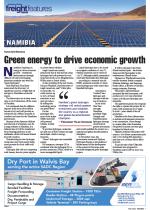Russia’s invasion of Ukraine is jeopardising economic recovery and growth in Namibia, along with three-quarters of other African countries.More than 70% of Africa’s economies are at severe risk from Russia’s war in Ukraine, according to preliminary assessments by the United Nations Task Team for the Global Crisis Response Group (G CR G).Agricultural commodity prices which have soared include wheat, barley, maize and sunflower oil.Energy prices, most notably crude oil and natural gas, have also increased dramatically.The United Nations Conferenceon Trade and Development (Unctad) estimates that Africa imported wheat worth $3.7 billion(32% of total African wheat imports) from the Russian Federation, and wheat worth $1.4bn from Ukraine (12% of the total) from 2018-2020.Namibia is identified as one of 36 countries in the world that import more than 50% of their wheat from Russia and Ukraine.In 2020, there were no imports from Ukraine.A key concern of the war is the supply of energy, according to an April brief published by the United Nations.It is not only the spot prices of fossil fuels that have increased.“Ships are now needed to carry gas and oil to replace energy that would otherwise be transported from Russia over shorter distances or by pipeline.“The higher bunker prices have a bearing on transport costs for all ships, and in fact all modes of transport. Bunker prices have been seriously affected and are today about twice the average of the five years pre-Covid,” states the brief.Fitch Solutions identifies Namibia as one of the sub-Saharan African countries where transport makes up more than 10% of the consumer price basket.The countries include Namibia’s neighbours Botswana, Mozambique and South Africa, as well as Uganda and Tanzania.The impact was confirmed by the Namibian ministry of mines and energy, which in April raised the price of petrol by 195 cents per litre to R19.10 and diesel by 295 cents to R20.23 per litre (Walvis B ay pr ic e s).This was after increases of R1.20/l for petrol and R1.30/l for diesel the previous month.According to spokesperson Andreas Simon, sanctions against Russian petroleum products added to existing constraints in fuel supplies.“The subsequent sanctions on the Russian Federation, one of the world's major oil producers, reinforced the shocks by making the situation in the global oil markets even more problematic.“These events are happening at a time when global oil supply is heavily unable to catch up with the levels of global demand for oil.“These geopolitical events are also happening at a time when upstream oil and gas exploration projects are heavily competing for investments with the renewable energy sector, and while many ageing crude oil refineries are shutting down across the world,” he said.The impact of the war is expected to be felt in Namibia for some time.“The ministry wishes to inform the public that the country is indeed facing a very tough and uncertain situation over the coming months, given what is happening in the world right now.“Great financial sacrifices will have to be made at both the individual and the collective level, because it is the only way we will be able to overcome the current difficulties,” the statement concludes.

